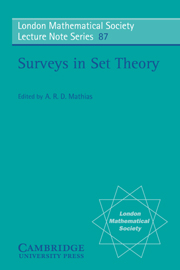Book contents
- Frontmatter
- Contents
- PREFACE
- ITERATED FORCING
- THE YORKSHIREMAN'S GUIDE TO PROPER FORCING
- THE SINGULAR CARDINALS PROBLEM; INDEPENDENCE RESULTS
- TREES, NORMS AND SCALES
- ON THE REGULARITY OF ULTRAFILTERS
- MORASSES IN COMBINATORIAL SET THEORY
- A SHORT COURSE ON GAP-ONE MORASSES WITH A REVIEW OF THE FINE STRUCTURE OF L
- LIST OF PARTICIPANTS
ITERATED FORCING
Published online by Cambridge University Press: 04 August 2010
- Frontmatter
- Contents
- PREFACE
- ITERATED FORCING
- THE YORKSHIREMAN'S GUIDE TO PROPER FORCING
- THE SINGULAR CARDINALS PROBLEM; INDEPENDENCE RESULTS
- TREES, NORMS AND SCALES
- ON THE REGULARITY OF ULTRAFILTERS
- MORASSES IN COMBINATORIAL SET THEORY
- A SHORT COURSE ON GAP-ONE MORASSES WITH A REVIEW OF THE FINE STRUCTURE OF L
- LIST OF PARTICIPANTS
Summary
Introduction and terminology.
In view of the great number of independence problems which have been solved by Cohen's method of forcing, it is not surprising that the ones remaining seem to require more and more sophisticated techniques for their solution. One such technique receiving considerable attention recently is the technique of iterated forcing, in which the set of forcing conditions is built up inductively and the ultimate generic extension is regarded as having been obtained in a series of stages, each one generic over the ones preceding. This technique has its roots in the Solovay-Tennenbaum consistency proof of Martin's Axiom, but recently there has been a series of striking applications of the method and its variations such as Silver's use of reverse Easton forcing, Laver's proof of the consistency of the Borel Conjecture, and Shelah's consistency proof of the nonexistence of P-point ultrafilters.
This paper is an introduction to iterated forcing for the reader already familiar with the rudiments of forcing. A more complete discussion of prerequisites will be found below.
The paper is organized as follows. Section 1 contains the general definition of an α-stage iteration, together with some elementary observations about iterated forcing. In Section 2 the basic facts about chain conditions and closure conditions in iterations are proved, and these results are immediately applied in Sections 3 and 4 to obtain the consistency of Martin's Axiom and of a generalized form of Martin's Axiom.
- Type
- Chapter
- Information
- Surveys in Set Theory , pp. 1 - 59Publisher: Cambridge University PressPrint publication year: 1983
- 72
- Cited by



